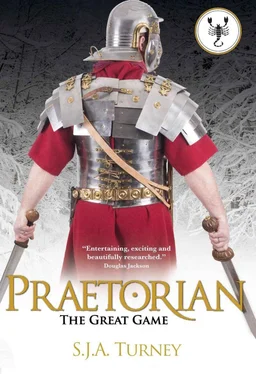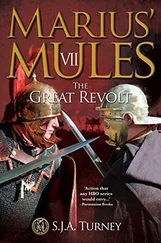S.J.A. Turney - The Great Game
Здесь есть возможность читать онлайн «S.J.A. Turney - The Great Game» весь текст электронной книги совершенно бесплатно (целиком полную версию без сокращений). В некоторых случаях можно слушать аудио, скачать через торрент в формате fb2 и присутствует краткое содержание. Год выпуска: 2015, Издательство: Mulcahy Books, Жанр: Исторические приключения, на английском языке. Описание произведения, (предисловие) а так же отзывы посетителей доступны на портале библиотеки ЛибКат.
- Название:The Great Game
- Автор:
- Издательство:Mulcahy Books
- Жанр:
- Год:2015
- ISBN:нет данных
- Рейтинг книги:4 / 5. Голосов: 1
-
Избранное:Добавить в избранное
- Отзывы:
-
Ваша оценка:
- 80
- 1
- 2
- 3
- 4
- 5
The Great Game: краткое содержание, описание и аннотация
Предлагаем к чтению аннотацию, описание, краткое содержание или предисловие (зависит от того, что написал сам автор книги «The Great Game»). Если вы не нашли необходимую информацию о книге — напишите в комментариях, мы постараемся отыскать её.
The Great Game — читать онлайн бесплатно полную книгу (весь текст) целиком
Ниже представлен текст книги, разбитый по страницам. Система сохранения места последней прочитанной страницы, позволяет с удобством читать онлайн бесплатно книгу «The Great Game», без необходимости каждый раз заново искать на чём Вы остановились. Поставьте закладку, и сможете в любой момент перейти на страницу, на которой закончили чтение.
Интервал:
Закладка:
Commodus was the first to take one of the blazing pitch-soaked torches and touch it to the pyre, watching as the flames ripped through the incendiary wadding between the timbers. Lucilla was close behind, followed by her husband, the Syrian Pompeianus, then Commodus’ wife Bruttia – stunning even in her plain funeral garb. Paternus and Perennis added their flames, and then others: many more, one after the other, until the pyre became a great orange inferno, the features of the former emperor lost to the ravages of the fire.
As the pyre collapsed in on itself, taking with it the charring remains of Marcus Aurelius, the crowd’s moaning slowly turned from wails of despair to hollow calls of respectful loss and finally someone in the crowd had shouted ‘Hail Aurelius… Hail Caesar!’ to the burning morass.
The rites and ceremonies over, Commodus had made a speech to the grieving populace, reminding them that the great man was not simply dead, but had been transformed and now watched over them in a far more powerful manner, from among the Gods. He had reminded the people that, despite the sadness of the day, there was still reason for them to celebrate, as the ever-present threat of the barbarians at their door had been broken. He had promised to rule as wisely as his father and to always hold the people of Vindobona and the province of Pannonia dear to his heart as the foundation of his tenure as emperor.
The army had ‘hailed Caesar’ for his largess when he had announced their return to Rome, but Rufinus suspected no one would have cheered as loud as the defeated tribes. Commodus had brokered a deal with the captive leaders that was, in retrospect, marvellous for all concerned. Marcomannia was a poor, unproductive land and so, instead of Roman settlers trying to eke out a living in this barren land, trying to turn a profit and send their goods to Rome, the barbarians would retain their own lands, using them to supply Rome with grain, goods, gold and men. Rome would benefit, replenishing some of the finances lost in the wars, while the barbarian leaders showered the emperor with praise, gratitude and personal gifts, not only for their sudden and unexpected freedom, but for the right to retain control over their former lands.
Hail Caesar !
Here: a new salute; a first salute to a new leader; a man with youth, strength, vision and intelligence. The peasants and freedmen along the sides of the Via Flaminia bellowed their chant again and again, just like that cold day back in Vindobona. There had been two such cries that day, and for very different reasons.
Suddenly the column crested the hill and Rome came into view.
Rufinus drew in an astonished breath.
In Hispania he had lived near Tarraco, an Imperial provincial capital, replete with all the great public works one would expect; a seething, busy mass of endless crowds and deafening noise. He had visited the ports at Barcino and Ampurias as well as Saguntum and Dianium, and even travelled south once to visit the great sprawl of Carthago Nova, the city of Hannibal. He had, on his way to join the Tenth Gemina, passed through the ancient ports of Narbo and Massilia.
None of them were fit to play shadow to this: the centre of the world.
What initially surprised Rufinus was the sheer scale of the sprawl, which extended from the base of the hill they had just crested and off into the distance over humps and bumps and dips, off along the silvered snake of the Tiber and far enough that the edge between it and the countryside beyond blurred in the heat.
More surprising was his second realisation: that the city walls were as useless to Rome as a scroll to a blind man or, as his uncle Publius habitually said ‘useless as a woman to a Greek’. In the tales he’d heard of Rome, the walls and gates had figured impressively. The invading Gauls, so many centuries ago, had gained entrance to Rome through stealth and treachery, despite the great defences. Every merchant told of having his wares checked on occasion as he passed through this gate or that. What none of them had ever seen fit to mention was that the great, thick stone walls, in reddish stone blocks of enormous size and punctuated with heavy gates, guarded by thick, squat towers, were now somewhere in the depths of the city, poking out impotently above rooftops. The mass of the great urban sprawl had so outgrown the walls that by the time an enemy came to be stalled by them, he could have looted and burned more than half the city’s structures.
Rome had become too big for its own defences and, in Rufinus’ opinion, that might easily be the city’s downfall someday. A slave girl, scraping the carbonised detritus from the curve of a large, bronze cooking pot, looked up and gave a half-hearted cheer, glancing nervously along the wall to where her master stood crying out his best wishes.
He was reminded momentarily of the morning after the funeral, when Lucilla had departed Vindobona, climbing into her carriage for the long journey back to Rome. As the emperor’s sister had placed her foot on the first step and allowed herself to be helped into the vehicle, the young slave girl whose very presence sent tingles down Rufinus’ spine appeared, wrapped in a plain wool blanket that would have cost less than the leather tie that held her mistress’ robe fastened.
Standing in line with his fellow Praetorians and trying not to catch the eye of the deranged bully Scopius who stood opposite, Rufinus had watched with a combination of excitement and sadness as the breath-taking and fascinating young woman paused before climbing aboard.
In that moment she had flashed a smile at him.
Directly at him!
He had been startled, and pleased, but the greater surprise was to follow: Tiberius Claudius Pompeianus, the Syrian husband of Lucilla, exited the building last of the entourage and Rufinus had to double-take. His eyes had not deceived him! The man was wearing his toga as usual, but the young soldier’s eyes were drawn instead to the small coronet on the Syrian’s head. A silver circlet rested on his brow, decorated with innumerable criss-crossed spines, not unlike a very regular thorn bush, or the defences formed around a marching camp using sudis stakes. It was a relatively plain and tasteful decoration, not like the gaudy, bejewelled trinkets worn by most nobles.
But it wasn’t the form the coronet took that had made Rufinus draw breath sharply. It was what it meant! The ‘grass crown’ was the highest military award a general in the field could achieve. Great men who had paraded through the streets of Rome with their legions to triumphal acclaim would have readily given up all such pomp for the right to wear the grass crown. Bestowed upon a general for breaking a blockade and saving an army, the award was the only one given to a commander by the general consent of the forces.
In one blinding moment, Rufinus’ opinion of the oily Syrian flipped on its back. The man had clearly served a term in military command and during that time had pulled off a victory which had earned him an acclaim given to only a handful of men in the history of Rome, including the great Scipio and divine Augustus himself!
Suddenly he’d realised that the continual look of bored irritation on the man’s face was no expression of vapid lack of wit, but rather the look of a caged lion, bound in marriage to a woman who hated him and yet wielded vastly superior power.
Someone ahead in the column shouted something about the Fontinalis gate that went unheard this far back, and the atmosphere among the men shifted subtly in a wave along the ordered lines. Despite the distance yet to go to the barracks, the feeling that the journey was finally over and that they had arrived in Rome hit every last man. The relief was almost tangible.
Ahead, the carriages rumbled on, picking up pace only slightly in the drivers’ eagerness to reach their destination. As Rufinus scanned the vehicles, wondering what it was like travelling in such luxury and musing on whether his grandfather had owned such a vehicle in his days as a senator, the curtains in the rear carriage billowed.
Читать дальшеИнтервал:
Закладка:
Похожие книги на «The Great Game»
Представляем Вашему вниманию похожие книги на «The Great Game» списком для выбора. Мы отобрали схожую по названию и смыслу литературу в надежде предоставить читателям больше вариантов отыскать новые, интересные, ещё непрочитанные произведения.
Обсуждение, отзывы о книге «The Great Game» и просто собственные мнения читателей. Оставьте ваши комментарии, напишите, что Вы думаете о произведении, его смысле или главных героях. Укажите что конкретно понравилось, а что нет, и почему Вы так считаете.












